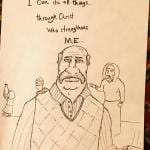I’m reading Religious Potential of the Child again because, well, it’s been a few years and I’ve found myself trying to tell other people to read it, and it suddenly occurred to me that it would help if I had more of it at my fingertips (this is true about literally everything in my life, tragically). Also, as abortion has roiled itself back into the national “conversation,” I felt like there were some points that Cavalletti makes that bear on larger issues than just how to catechize young children. The bit that I was searching for is pretty near the beginning, so you wouldn’t even have to read that far. This:
The child’s need to be loved depends not so much on a lack that requires filling, but on a richness that seeks something that corresponds to it.
And then this:
The younger the child the more capable he is of receiving great things and the child is satisfied only with the great and essential things. The child’s interior life is deeply serious and without trappings.
And then this:
The adult should proclaim God, who reveals His love through His Christ.
And this:
The catechist who knows how to observe the child will realize that it is the greatest and most essential realities that the child seeks in which the child delights and is appeased. A three-and-a-half-year-old boy had already heard the Good Shepherd parable when someone spoke to him of the guardian angel, explaining that it is an angel that the Lord gives to protect us; the child (sit venia verbis) observed: “What do I need an angel for? I have the Good Shepherd.” Between two figures that both express God’s protective love, the child did not hesitate to choose the greater.
And then, ouch, this:
We cannot deny that it is precisely the greatest realities that we neglect to give the child; we hardly touch on them, taking them for granted. However, we should ask ourselves if it is actually superfluous to announce that God is unfailing love, that Christ is truly risen. To what degree are we ourselves convinced of these realities?
I mean, obviously, you should read the whole book. At the very least, if you come across a child, you will be reminded to do things like count your words, which is good for literally every life occassion. But also, for the person who wants to swim upstream against, say, a “culture of death,” putting into practice what Cavalletti describes is a very basic activity for any Christian. It is a practical way of learning how to put someone else first, as all of the Bible commands. Trying to sit with a very young child to think about that which is most “essential” means putting your own feelings about everything on hold for at least an hour. It’s not about how you are doing, or worse, your feelings about yourself and your own abilities, but about not getting in the way of the child and his encounter with the living Word.
The unborn John the Baptist meeting and recognizing the yet unborn Christ is a most alarming picture of what the adult human creature is up against as he considers the great mystery of God. He must first admit to himself that the one whom God knits together in the darkness of the womb is a separate person, a person who can know God in a way that no adult bashing around life can fully understand. The layers that we add to ourselves to insulate ourselves from the great reality of God may help us to cope with the difficulties of every day life, but they are not “life-giving” layers, they are usually all about death, about sin, about not having to repent and believe in a God who chiefly identifies himself with the weakest, the most powerless, the silent, the hungry, the helpless. I say “he,” but women have to discover this as well. The “thing” inside a body of a woman is a person, with a soul. Her soul matters, and so does that of the child, and God knows both. Even more so, God is able to communicate himself to both, though the one who lacks speech, who lives yet in darkness, ironically, in all the uncluttered newness of life without having indulged in great and small sins, will be able to hear the Word, to see the Light more clearly. But the gospel of Jesus, the Good Shepherd who lays down his life for the sheep, is for both of them.
All I’m saying is, if we can’t understand or value the child before he can justify his own existence to us, we can’t undersatnd very many things.
Photo by Flavio Gasperini on Unsplash












